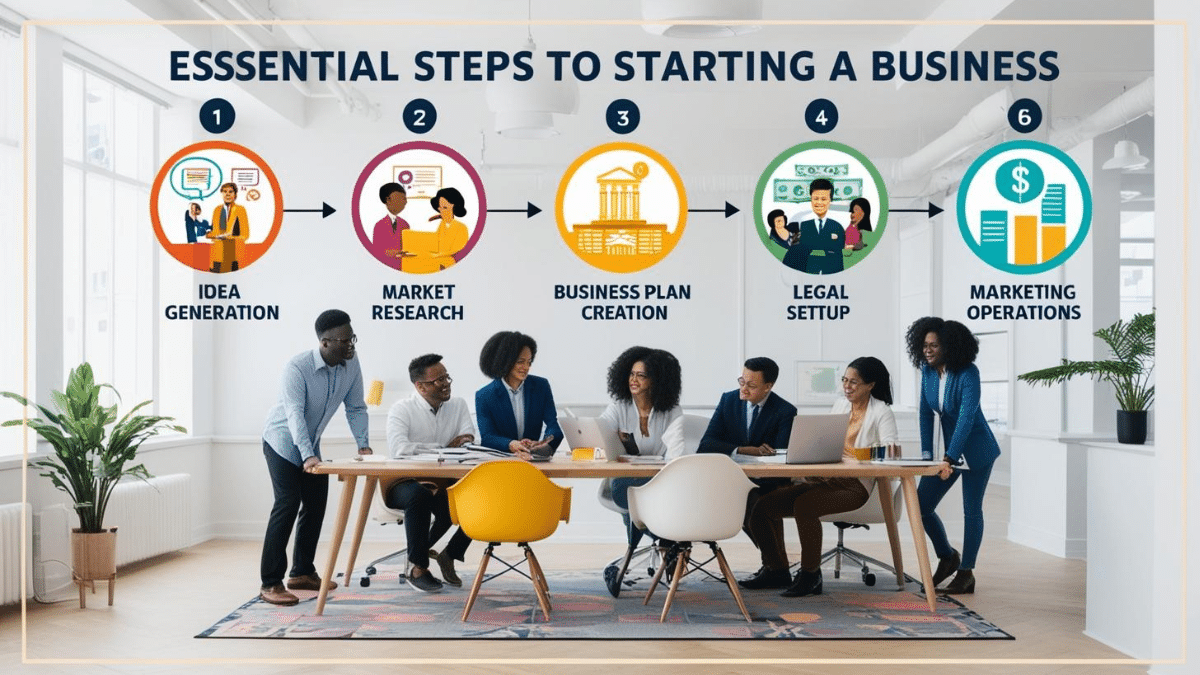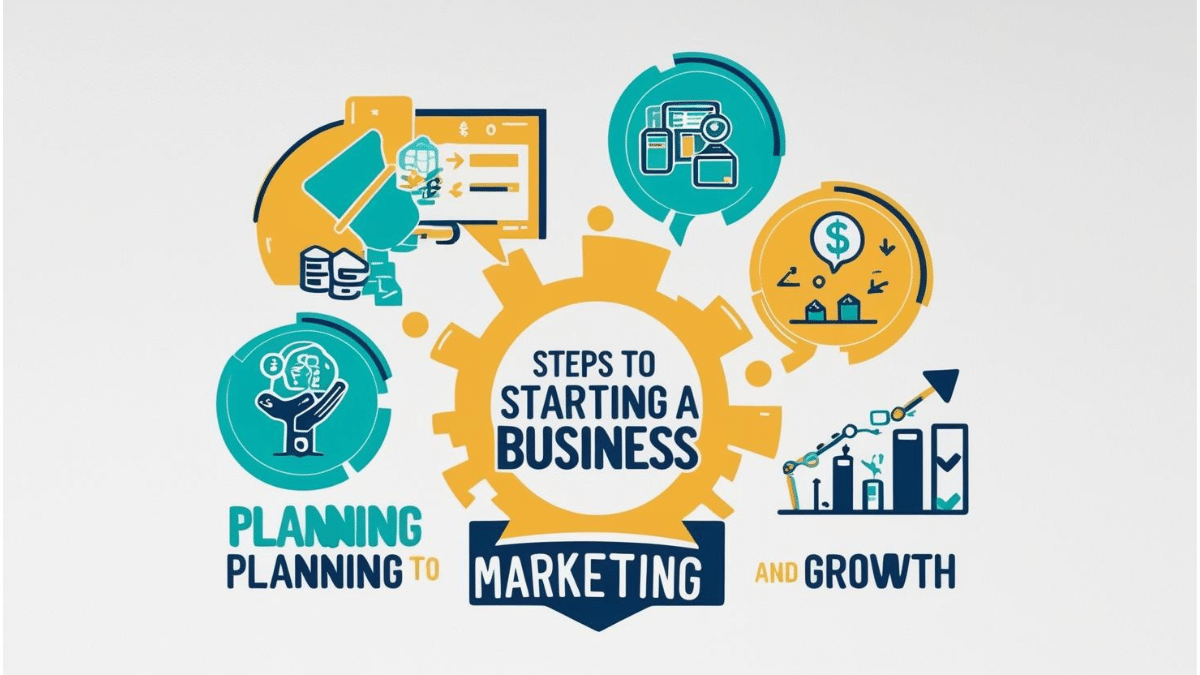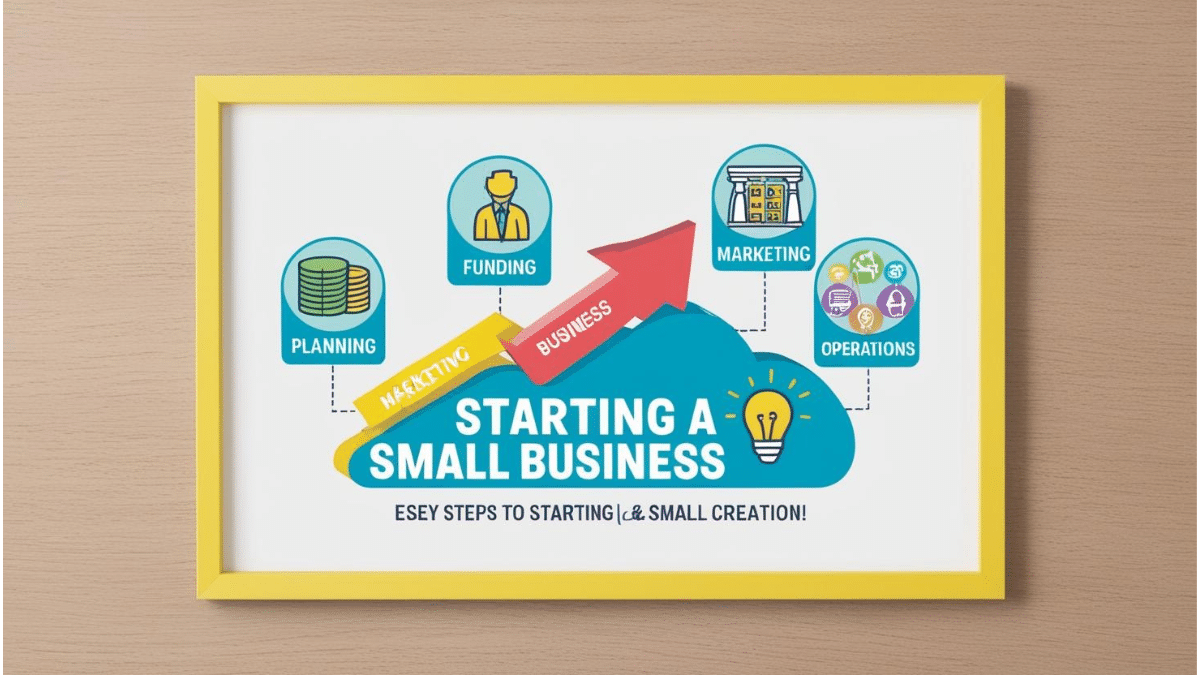Launching a business is more than just selling products or services it’s about building a vision, solving problems, and making an impact. If you’re wondering what you need to start your own business, you’re not alone. Many people dream of being their own boss but don’t know where to begin.
This in-depth guide will walk you through every essential component required to launch, manage, and grow a successful business—whether it’s a physical store, an online brand, or a service-based venture.
1. A Winning Business Idea 💡
All successful businesses begin with a great idea. But not every idea is a business-worthy one. Your concept should align with market needs, solve a real problem, and preferably be something you’re passionate about.
How to Find and Validate a Business Idea:
- Look around you: What problems do people often complain about?
- Evaluate your skills and passions: What are you good at? What do you love doing?
- Assess profitability: Can this idea make money?
- Validate with research: Use surveys, interviews, or run a test campaign to measure interest.
👉 Pro Tip: Use platforms like Reddit, Quora, or Google Keyword Planner to explore what people are actively searching for or struggling with.
2. Purpose, Passion, and the Right Mindset
Starting your own business is exciting, but it’s also challenging. You’ll face competition, setbacks, and maybe even self-doubt. That’s why you need a strong mindset and a deep “why.”
Characteristics of a Strong Entrepreneurial Mindset:
- Growth-oriented: Open to learning and adapting.
- Resilient: Able to bounce back from failure.
- Self-motivated: Capable of working without supervision.
- Risk-tolerant: Willing to make bold decisions when needed.
⚠️ Remember: Entrepreneurship isn’t a straight line. Your mindset will either make or break your business in the long run.
3. Thorough Market Research and Competitor Analysis
Market research helps you understand the landscape you’re entering. If you skip this step, you risk building something no one wants—or creating a product already offered better and cheaper by competitors.
Market Research Checklist:
- Identify your target audience (demographics, interests, location).
- Research competitors: pricing, marketing strategy, customer feedback.
- Study industry trends and future projections.
- Find gaps or pain points that others aren’t addressing.
🛠 Tools You Can Use:
- SEMrush / Ahrefs for competitor analysis.
- Typeform / Google Forms for user surveys.
- Ubersuggest for keyword demand.
- Statista or government census data for industry statistics.
4. A Strategic Business Plan 📘
Your business plan is like your GPS—it guides you and helps you stay on track. It’s also a necessary document if you seek investment or apply for loans.

What Your Business Plan Should Include:
- Executive Summary – A quick overview of your business.
- Business Description – Mission, vision, and core values.
- Market Analysis – Data on industry trends, competitors, and customers.
- Organization and Management – Team structure and leadership roles.
- Product or Service Line – What you’re selling and how it’s different.
- Marketing and Sales Strategy – How you’ll attract and convert customers.
- Funding Request – How much money you need (if applicable).
- Financial Projections – Income statements, cash flow, break-even analysis.
📌 Tip: Keep it professional but flexible—update your plan as your business evolves.
5. Legal Structure, Registration & Permits
Setting up your business legally is critical. Depending on your location and business type, you must register your business and acquire specific licenses.
Legal Structures (choose what fits best):
- Sole Proprietorship – Easy and affordable, but no liability protection.
- Partnership – Shared control and profit with another individual.
- LLC (Limited Liability Company) – Popular for small businesses with limited liability.
- Corporation (Inc/Pvt Ltd) – Suitable for scaling and raising external capital.
Basic Legal Setup:
- Register your business name (Trademark it if necessary).
- Get a Business PAN/TIN/GST (based on your country).
- Apply for licenses/permits (food license, trade license, etc.).
- Draft contracts or agreements if dealing with partners or clients.
💼 Consider consulting a legal expert for guidance, especially if you’re in a highly regulated industry.
6. Funding: Capital to Get Started 💸
You don’t always need a huge sum to start, but some form of initial capital is usually required to cover startup expenses, marketing, product development, and operations.
Popular Funding Options:
- Bootstrapping – Using your own savings or side income.
- Friends & Family – Trusted support network.
- Small Business Loans – From banks or credit unions.
- Angel Investors – Wealthy individuals who invest in startups.
- Venture Capitalists – Institutional investors looking for scalable companies.
- Crowdfunding – Platforms like Kickstarter or Indiegogo.
💡 Budget Tip: Keep your expenses lean in the beginning. Focus on essentials and reinvest profits.
7. Business Bank Account & Accounting System
Keep your personal and business finances separate from day one. A dedicated bank account will help you maintain clear financial records and improve your business’s credibility.
Set Up:
- Open a business checking account.
- Get a business credit/debit card.
- Choose an accounting system or hire an accountant.
📊 Software to Consider:
- QuickBooks
- FreshBooks
- Xero
- Tally ERP (India-specific)
Track all expenses, income, vendor payments, and taxes from day one.
8. Branding: Identity That Resonates 🎨
Branding is more than a logo—it’s the entire experience your business offers. It builds trust, makes you memorable, and differentiates you in a crowded market.

Branding Essentials:
- Business Name – Simple, unique, and available as a domain.
- Logo – Professionally designed to reflect your brand’s tone.
- Colors & Fonts – Consistent across all channels.
- Tone & Messaging – Friendly, formal, quirky, helpful—choose what fits.
🔥 Use tools like Canva, Looka, or Fiverr to design brand assets affordably.
9. Build Your Product or Service
Once the foundation is laid, it’s time to develop your product or set up your service.
Product-Based Business:
- Design a prototype or MVP (Minimum Viable Product).
- Work with manufacturers or wholesalers.
- Set up packaging, pricing, and delivery logistics.
Service-Based Business:
- Outline service packages or tiers.
- Build a scheduling/booking system.
- Set clear boundaries (working hours, revisions, etc.).
🔁 Test and iterate. Take feedback seriously and tweak your offering accordingly.
10. Online Presence: Website + Social Media 🌐
In today’s digital age, if you don’t exist online, you barely exist at all.
Website Must-Haves:
- A clear homepage explaining what you do.
- About Us and Contact pages.
- A blog or resource section for SEO.
- Secure payment gateway (if selling online).
- Mobile responsiveness and fast loading speed.
Use platforms like:
- WordPress
- Shopify (for eCommerce)
- Wix / Squarespace (drag-and-drop builders)
Also, create business accounts on:
- Twitter/X
- YouTube or Pinterest (if visual content is relevant)
11. Marketing Strategy: Attract and Convert Customers 📢
You can build the best product in the world, but without marketing, nobody will know it exists.
Types of Marketing:
- Digital Ads: Google Ads, Facebook/Instagram Ads
- Content Marketing: Blogs, YouTube videos, case studies
- Email Marketing: Newsletters and automated drip campaigns
- Influencer Collaborations: Work with micro-influencers
- Referral Programs: Encourage customers to refer friends
📈 Measure ROI using tools like:
- Google Analytics
- Facebook Pixel
- Mailchimp or ConvertKit
Be consistent. Build a brand presence over time rather than chasing instant results.
12. Customer Service: The Secret to Growth 🤝
Excellent customer service isn’t just a support function—it’s a growth engine.
Best Practices:
- Respond to inquiries quickly.
- Offer refunds/returns where reasonable.
- Collect feedback and reviews.
- Use CRMs (Customer Relationship Management tools) like Zoho CRM, HubSpot, or Freshdesk to manage customer relationships.
💬 Tip: Use chatbots or WhatsApp Business for instant interaction.
13. Monitor Performance and Scale Up 📊
Once your business is stable, look for opportunities to scale.

Key Metrics to Track:
- Monthly revenue and profit
- Customer acquisition cost (CAC)
- Lifetime value of a customer (LTV)
- Website traffic and conversion rates
- Churn rate or customer retention
Explore automation tools to save time:
- Zapier for task automation
- Hootsuite for social media
- Calendly for scheduling
When you’re ready, consider expanding to new locations, product lines, or markets.
14. Continuous Learning and Adaptation
The business world evolves constantly. Entrepreneurs must never stop learning.
How to Stay Sharp:
- Read books like The Lean Startup, Start With Why, and Zero to One.
- Listen to podcasts: The Tim Ferriss Show, How I Built This, Smart Passive Income.
- Take online courses: Udemy, Coursera, Skillshare, HubSpot Academy.
- Network with other business owners via LinkedIn or local business chambers.
Always be ready to pivot, evolve, and meet new demands.
Starting a Business Is a Journey, Not a Destination
Starting your own business requires more than just money and an idea. It takes vision, perseverance, planning, and execution. You’ll wear many hats—salesperson, marketer, accountant, strategist, and sometimes janitor. But the rewards—freedom, impact, and self-fulfillment—are worth every bit of the hustle.
🚀 Take the first step today. No one builds an empire overnight, but you can start laying the foundation right now.
Frequently Asked Questions (FAQs)
Q1. Can I start a business with no money?
Yes. Many service-based or online businesses (like freelancing or affiliate marketing) require little to no investment. Start small and reinvest profits.
Q2. Do I need to quit my job to start a business?
Not necessarily. Many entrepreneurs start their business as a side hustle until it grows.
Q3. How long does it take to become profitable?
It varies. Some businesses are profitable in 3–6 months; others take a year or more depending on industry and expenses.
Q4. Do I need a co-founder?
Not always. Solo founders can succeed too. But co-founders can offer complementary skills and share responsibilities.







